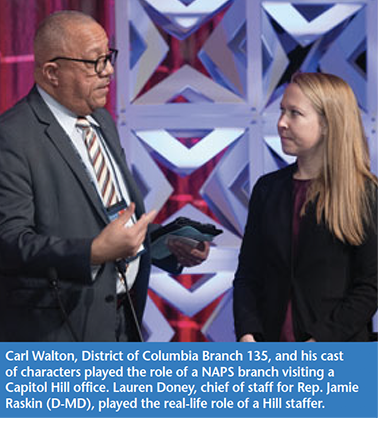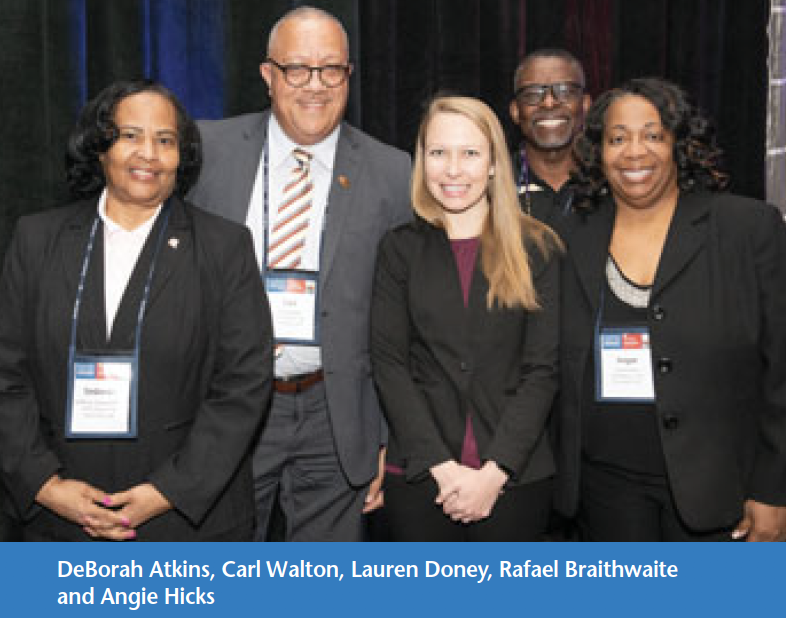For this year’s role-playing of the do’s and don’ts of conducting visits with lawmakers on Capitol Hill, Lauren Doney, chief of staff for Rep. Jamie Raskin (D-MD), participated and offered a valuable critique. Playing the roles of NAPS members were Carl Walton, District of Columbia Branch 135; Angie Hicks, Greensboro, NC, Branch 157; DeBorah Atkins, Branch 135; and Rafael Braithwaite, Birmingham, AL, Branch 45.
 Regarding the presentation, Doney said it was helpful to hear about the financial impact of the Postal Service, especially on the House side. “There’s a misconception that the USPS is operating in a deficit, but when you explain the agency gets no taxpayer dollars, it’s an important educational process, even if you mention it briefly. It’s great to hear from people in your district and region. Knowing my boss is on some of your bills means you did your research.”
Regarding the presentation, Doney said it was helpful to hear about the financial impact of the Postal Service, especially on the House side. “There’s a misconception that the USPS is operating in a deficit, but when you explain the agency gets no taxpayer dollars, it’s an important educational process, even if you mention it briefly. It’s great to hear from people in your district and region. Knowing my boss is on some of your bills means you did your research.”
After the “visit,” Doney commended the group for being clear about what they wanted. Saying the leave-behind information was very helpful, she thanked the group for the quick meeting and not drawing it out. She offered that sometimes congressional meetings get cut short, so it’s helpful to have leave-behind information.
Walton asked Doney if there was anything of no value or that she wished they had not done. She said some groups take too long a time to provide
background information before getting to the “ask.”
“Taking a lot of time without an ask is the number-one failure,” she said. “They tell me interesting things and important problems, but my job at the end of the meeting is to have a clear idea of what you are asking, whether it’s to cosponsor a bill, sign a letter or contact other legislators. Having a clear, one-line ask is essential for effective advocacy. Leaving contact information is helpful. And it’s always nice to mention up front if you’re from the district my boss represents.”
Doney also pointed out it’s helpful knowing the titles of bills and companion bills the lawmaker is being asked to support.
“Mention a house companion you should cosponsor or mention there is no companion bill; that is helpful,” she added.

Walton asked what is the best way to bring their message to a lawmaker they know is not supportive of the issue. “A member may not know or is not adequately educated,” she suggested. “Don’t assume. Some will not be supportive. If they say ‘no,’ that’s appropriate. You can respond, ‘If it comes to the floor, we would encourage your boss to support it.’”
Doney said Raskin has an open-door policy and meets with everyone, even if he doesn’t agree with their viewpoints. He is open to listening and may respectfully disagree, but he wants to hear what that person has to say, she explained.
“If there’s the opportunity to have a productive conversation—with concepts and education—that is where you may be able to find common ground,” she offered.
“Knowing postal issues that affect their district is very helpful.”
For more about the 2020 Legislative Training Seminar (LTS), click on the links below:
Harnessing the Power of NAPS Delegates to Effect Change for All EAS Employees
Congressional Representatives Address Delegates at LTS 2020
H.R. 6085: The Postal Supervisors and Managers Fairness Act of 2020
The 2020 Stanley Gold Award for Legislative Excellence
1727 King Street, Suite 400
Alexandria, VA 22314-2753
703-836-9660 (phone)
703-836-9665 (fax)
Website by Morweb.org
Privacy Policy Copyright 2023
